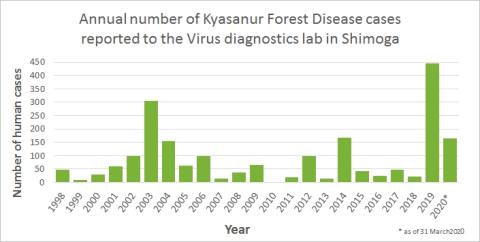Many millions of people depend upon tropical forests for food, fuel and livestock fodder. When accessing these services, especially in degraded and fragmented forests, people are exposed to pathogens that cycle naturally in the wildlife population and are often transmitted by arthropod vectors, such as biting insects or ticks. Diseases that cycle between animals and humans are called zoonoses or zoonotic diseases.
Globally, upsurges in many zoonoses, such as Ebola and Leishmaniasis, have been linked to forest loss or fragmentation but the underlying mechanisms are not well understood.

MonkeyFeverRisk is a multi-agency research project that develops innovative interdisciplinary frameworks to help communities avoid exposure to zoonotic diseases whilst maximising the livelihood benefits they derive from tropical forests. We focus on the emerging tick-borne infection Kyasanur Forest Disease (KFD) that affects low-income communities in the Western Ghats forest in India. Our research project links expertise in public and animal health, forest and wildlife ecology earth observation with social science, and translates empirical data and knowledge into tools for disease managers across sectors.
Our approach
We aim to identify and measure the ecological and social processes that might underpin Kyasanur Forest Disease risk concurrently across disease-affected fragmented forest landscapes. We will determine how these processes are modulated by forest and climate conditions. We use earth observation and epidemiological models to interpret historical patterns of KFD infection in relation to forest and climate change at a regional scale. Based on this improved understanding of the Kyasanur Forest Disease system and together with the wide-ranging actors and beneficiaries who interact with forest ecosystem and manage KFD we are co-producing decision support tools and guidance for the public health, animal health and forestry sectors.
Funding
The MonkeyFeverRisk project is supported by the Global Challenges Research Fund and funded by the MRC, AHRC, BBSRC, ESRC and NERC [grant number MR/P024335/1]
Research team

